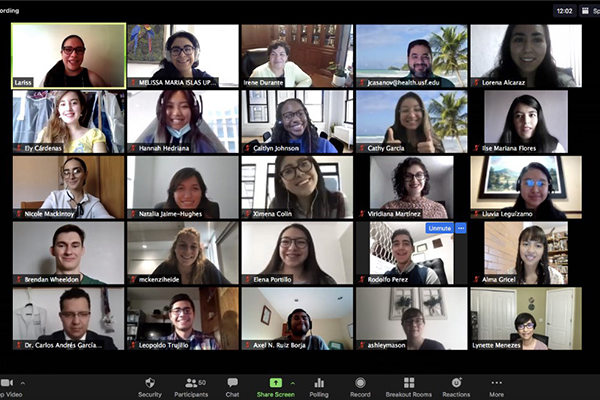
Participants of the first meeting of the first language exchange between USF Health students and medical students at the National Autonomous University of Mexico. Photo courtesy of Melissa M. Islas Upequi, MD, head of the UNAM School of Medicine International Relations Office GlobalFacMed.
More than 50 members of USF Health and the National Autonomous University of Mexico (UNAM) recently gathered via an online meeting for a first language exchange, as part of a virtual language exchange program between the UNAM College of Medicine students and MCOM students in the Medical Spanish Language Club.
The goal of the group is to support each other in learning medical English and medical Spanish.
MCOM, and all USF Health students, have access to Canopy Medical Spanish, an online course that follows the outline of the first year of medical school. In the self-paced course, Spanish phrases learned by USF Health students are reinforced by their UNAM counterparts, while MCOM students simultaneously teach UNAM students medical English.
The importance of learning a foreign language is increasingly important, especially in an extremely diverse area like Tampa, said Caitlyn Johnson, co-president of the club. Some specialties require their physicians to be bilingual. This club offers students another tool for when they become doctors.
“One of the contributing factors in positive patient outcomes is patients trusting their physicians. One way to help build that trust is being able to understand them if English isn’t their first language,” said Johnson.
Shirley Smith, director of MCOM’s Office of Student Diversity and Enrichment, added that doctors often earn the trust of their patients by simply attempting to learn the native language of patients who don’t speak English. “This often gives patients the feeling their physician has their best interests in mind and they want to make sure none of the information they have is lost in translation. This will help enhance the relationship, which leads to better patient care and better outcomes.”
Nearly one in five people in the US are of Hispanic origin. We urgently need bilingual providers that can provide the best care to these patients and improve their health outcomes. I believe this unique virtual language exchange program between USF and UNAM medical students will foster the next generation of bilingual doctors at USF who can serve patients here in the US and abroad. And in doing so, I envision that our USF medical students will cultivate life-long friendships with their colleagues in UNAM. – Lynette Menezes, PhD, associate vice president of USF Health International
